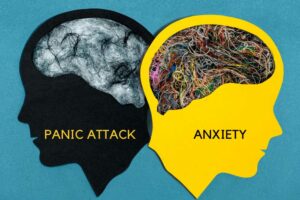If you have ever been diagnosed with major depressive disorder, you know what it feels like. You feel overwhelmingly tired, like all you want to do is sleep. Or maybe you can’t sleep. You don’t feel like eating, or you might overeat to try to bury the feelings. You may feel hopeless, helpless, and worthless. You wonder if you will ever feel happy again. But you got treatment and gradually you began to feel good again. You were happy. So when you feel the symptoms of depression coming over you again, you can feel very scared. You don’t want to go through that again. Not again.
The bad news is that if you have had an episode of major depression, you are apt to have another. About half of the people who have had one episode have another. Eighty percent of the people who have had two episodes will have a third. The good news is that if you recognize the symptoms early and take action, you may be able to ward off the episode of depression or make it less severe.
If you feel any of the symptoms of depression returning–disturbed sleep; changes in your appetite; persistent sadness; feeling worthless, helpless, or hopeless; wanting to isolate; losing interest in activities you usually enjoy–it’s time to take action.
Practice Self-Care
When you start to feel like you may be spiraling down into depression, it’s very important to take care of yourself. Do whatever you can to manage your schedule. Don’t take on any more commitments and delegate some of your responsibilities if you can. Work to reduce your stress level. Meditation is very good for managing your stress. If you don’t have a meditation practice, find an app to get you started. Or just find a comfortable place to sit, close your eyes, and simply notice your breath.
If you don’t exercise already, you need to start. Aerobic exercise like walking, jogging, running, swimming, cycling, or dancing reduces anxiety, stress, depression, negative mood, and helps with sleep, mental alertness, and overall elevation of mood. You’ll also benefit your body. Regular exercise helps you to maintain a healthy weight, boosts your immune system, improves your cardiovascular health, and helps to prevent type 2 diabetes and some types of cancer.
Spend Time With People
Although getting out and doing something social may be the last thing you want to do, it may be one of the best things you can do to fight depression. Stay in touch with people. Send an email or a text. If you are invited somewhere, go. You may dread going, but chances are that you’ll feel better when you get there, and you may even enjoy yourself.
You should also talk about how you are feeling. If you aren’t currently in therapy, find a therapist. Talk with a nonjudgmental friend about your feelings, someone who will be supportive of you. Let your spouse, partner, or roommate know what’s going on.
Look on the Bright Side
Although the idea that you can just snap out of depression is absurd, you can improve your mood by paying attention to your mental diet. Avoid dark, serious movies. Watch funny movies and shows, and look for silly clips on YouTube. Now is the perfect time for cat videos! Go to a comedy club. Read books that you enjoy. Cook your favorite meal or go out to your favorite restaurant. Spend time in nature. Nature can restore your soul. Take your workout outside if you can.
Allow Yourself to Feel
Although the thought of going through another episode of major depression can be enough to start you on a downward spiral, it is important that you accept your feelings. If you can, sit with your feelings. Observe them. Evaluate them: “Wow, I feel really awful today. I would give today a 7 out of 10 in terms of awfulness.” Remind yourself that it is normal to feel bad sometimes, that everyone has bad days or even weeks. As bad as you feel at the moment, remind yourself that it will pass. You won’t feel this way forever.
If you are aware of your feelings and know what situations, experiences, or people make you feel worse, you may be able to avoid another major depressive episode. Take care of yourself. Eat nutritious food, and exercise. Keep to your usual sleep schedule. Spend some time in meditation or prayer each day. Talk with someone you trust. If you aren’t currently in therapy, find a therapist. Spend time with people you like, and try not to worry about how you are feeling.
Depression can be debilitating and is a risk factor for developing an addiction to drugs or alcohol. Promising Outlook, located in Riverside, California, offers treatment for both depression and substance abuse. Through its comprehensive program rooted in the 12-Step philosophy, Promising Outlook focuses on treating the whole person, not just his or her addiction. Treatment plans are developed for each patient on an individual basis–since no two people are alike, their treatment shouldn’t be alike. Treatment at Promising Outlook focuses on addressing the trauma and mental health issues that can be at the root of a drug or alcohol addiction. Clinical treatment modalities offered include cognitive behavioral therapy (CBT), dialectical behavioral therapy (DBT), mindfulness-based stress reduction, motivational interviewing, and psychotherapy. Treatment programs are offered on an outpatient basis for men and women aged 18 and up. If you or someone close to you is struggling with an addiction to drugs or alcohol, call 866.980.2869.






